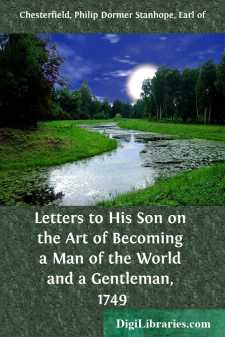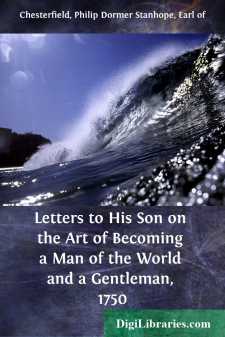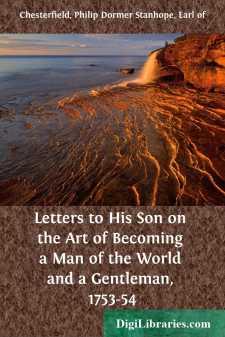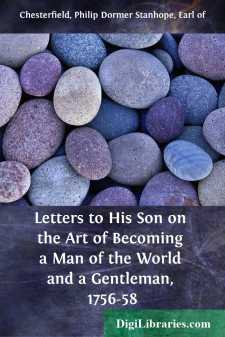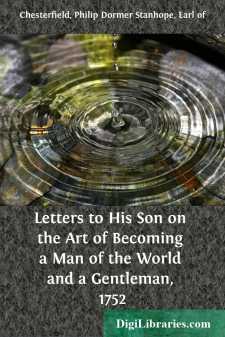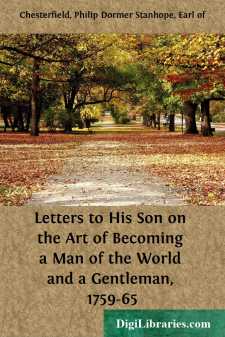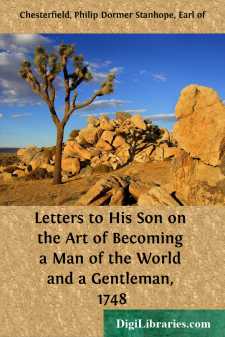Categories
- Antiques & Collectibles 13
- Architecture 36
- Art 48
- Bibles 22
- Biography & Autobiography 813
- Body, Mind & Spirit 142
- Business & Economics 28
- Children's Books 15
- Children's Fiction 12
- Computers 4
- Cooking 94
- Crafts & Hobbies 4
- Drama 346
- Education 46
- Family & Relationships 57
- Fiction 11829
- Games 19
- Gardening 17
- Health & Fitness 34
- History 1377
- House & Home 1
- Humor 147
- Juvenile Fiction 1873
- Juvenile Nonfiction 202
- Language Arts & Disciplines 88
- Law 16
- Literary Collections 686
- Literary Criticism 179
- Mathematics 13
- Medical 41
- Music 40
- Nature 179
- Non-Classifiable 1768
- Performing Arts 7
- Periodicals 1453
- Philosophy 64
- Photography 2
- Poetry 896
- Political Science 203
- Psychology 42
- Reference 154
- Religion 513
- Science 126
- Self-Help 84
- Social Science 81
- Sports & Recreation 34
- Study Aids 3
- Technology & Engineering 59
- Transportation 23
- Travel 463
- True Crime 29
Philip Dormer Stanhope Chesterfield
Philip Dormer Stanhope, 4th Earl of Chesterfield (1694-1773), was a British statesman, diplomat, and writer known for his wit and eloquence. He is best remembered for his "Letters to His Son," a series of correspondences offering advice on manners, education, and the art of becoming a gentleman, which were published posthumously. Chesterfield's works reflect his keen observation of society and his belief in the importance of social grace and practical knowledge.
Author's Books:
Sort by:
DEAR BOY: I have received your letter of the 31st December, N. S. Your thanks for my present, as you call it, exceed the value of the present; but the use, which you assure me that you will make of it, is the thanks which I desire to receive. Due attention to the inside of books, and due contempt for the outside, is the proper relation between a man of sense and his books. Now that you are going a...
more...
DEAR BOY: I have seldom or never written to you upon the subject of religion and morality; your own reason, I am persuaded, has given you true notions of both; they speak best for themselves; but if they wanted assistance, you have Mr. Harte at hand, both for precept and example; to your own reason, therefore, and to Mr. Harte, shall I refer you for the reality of both, and confine myself in this...
more...
MY DEAR FRIEND: It is now above a fortnight since I have received a letter from you. I hope, however, that you are well, but engrossed by the business of Lord Albemarle's 'bureau' in the mornings, and by business of a genteeler nature in the evenings; for I willingly give up my own satisfaction to your improvement, either in business or manners. Here have been lately imported from Paris...
more...
MY DEAR FRIEND: I received yours yesterday morning together with the Prussian, papers, which I have read with great attention. If courts could blush, those of Vienna and Dresden ought, to have their falsehoods so publicly, and so undeniably exposed. The former will, I presume, next year, employ an hundred thousand men, to answer the accusation; and if the Empress of the two Russias is pleased to argue...
more...
MY DEAR FRIEND: Laziness of mind, or inattention, are as great enemies to knowledge as incapacity; for, in truth, what difference is there between a man who will not, and a man who cannot be informed? This difference only, that the former is justly to be blamed, the latter to be pitied. And yet how many there are, very capable of receiving knowledge, who from laziness, inattention, and incuriousness,...
more...
MY DEAR FRIEND: 'Molti e felici', and I have done upon that subject, one truth being fair, upon the most lying day in the whole year. I have now before me your last letter of the 21st December, which I am glad to find is a bill of health: but, however, do not presume too much upon it, but obey and honor your physician, "that thy days may be long in the land." Since my last, I have...
more...
MY DEAR FRIEND: By your letter of the 5th, N. S., I find that your 'debut' at Paris has been a good one; you are entered into good company, and I dare say you will, not sink into bad. Frequent the houses where you have been once invited, and have none of that shyness which makes most of your countrymen strangers, where they might be intimate and domestic if they pleased. Wherever you have a...
more...
DEAR BOY: I am edified with the allotment of your time at Leipsig; which is so well employed from morning till night, that a fool would say you had none left for yourself; whereas, I am sure you have sense enough to know, that such a right use of your time is having it all to yourself; nay, it is even more, for it is laying it out to immense interest, which, in a very few years, will amount to a...
more...
The proud Lord Chesterfield would have turned in his grave had he known that he was to go down to posterity as a teacher and preacher of the gospel of not grace, but—"the graces, the graces, the graces." Natural gifts, social status, open opportunities, and his ambition, all conspired to destine him for high statesmanship. If anything was lacking in his qualifications, he had the pluck and...
more...
MY DEAR FRIEND: I received two days ago your letter of the 25th past; and your former, which you mention in it, but ten days ago; this may easily be accounted for from the badness of the weather, and consequently of the roads. I hardly remember so severe a win ter; it has occasioned many illnesses here. I am sure it pinched my crazy carcass so much that, about three weeks ago, I was obliged to be let...
more...


